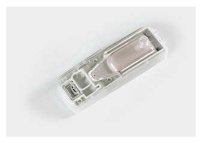Laser Plastic Welding in Medical Microfluidics
The clean, accurate, fast and flexible way forward.
The early days of microfluidic devices saw them confined to the laboratory. Their main uses were in drug discovery applications and in DNA testing. More cost-effective manufacturing techniques, particularly through lasers, has seen microfluidics move out of the laboratory and into the point of care. Using microfluidic-based Lab-on-a-chip technology, the sample preparation steps previously conducted in a laboratory using various items of equipment are now carried out at the point of care, thanks to a miniature chip. Chips are made of glass or plastic substrate and incorporate (micro) fluidic pathways to move the sample between the various stages of analysis. Blood, urine, saliva, stool and even breath can all be tested through this technology.

Because medical microfluidic devices are designed especially for use at the point of care, they can allow patients with chronic medical conditions to monitor themselves at home. GPs can test patients there and then without having to send samples to the lab and then wait for the results.
The High Volume Driver
Behind the move from low-volume specialised laboratory use to the high volume diagnostic devices of today is the development of laser plastic welding. Manufacturing microfluidic devices requires extreme precision and a particle-free process that gives clean-room compatibility. With laser plastic welding, these needs are met through:
- Joint lines in the micrometer range
- Hygienic energy input
- No foreign bodies or additives
- Traceability/end-to-end process monitoring
- Extremely short cycle times
- New design options
For high volume production, the key is repeatability which makes laser plastic welding ideal especially when combined with its high speed processes, accuracy and use on a range of materials. The choice of material is an important factor and can be a difficult balancing act. The OEM should work closely with its chosen laser company and ensure that company has the R&D, design and process engineering resources to ensure its performance and design-to-manufacture objectives are met.
The Microfluidics Specialists
TLM Laser’s product partners, Germany based LPKF, are long-term specialists in providing laser welding solutions to the microfluidics industry. One of their more recent products, the LPKF PrecisionWeld, underlines their dedication. A microfluidic device generally consists of two planar surfaces. The lower component contains the microfluidic pathways that are so fine that capillary forces override the effects of gravity. Channel widths of 100 µM are not uncommon. Creating a reliable, precise seam between these two layers is therefore essential. To avoid rejects, there should be no unwanted particles of additives created or included in the process. The LPKF PrecisionWeld delivers a fine weld seam with a width of just 100 µm – a level of precision unmatched by any other technology. Because it is a transmission laser welding system, there are no additives and components are not exposed to mechanical or high thermal stress. With its small laser focus, there are no unwanted particles.
The system offers several other important advantages in microfluidic applications including a scanner system to guide the laser beam and a positioning table. This expands the effective working area to 320x320 mm.
For full details on the LPKF PrecisionWeld laser plastic welding system and help in meeting your microfluidic device production needs, please contact sales@tlm-laser.com